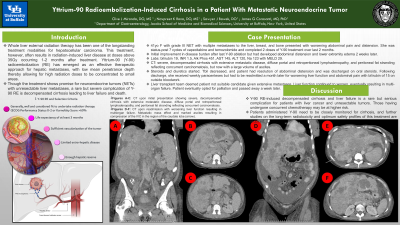Monday Poster Session
Category: Liver
P2550 - Yttrium-90 Radioembolization-Induced Cirrhosis in a Patient With Metastatic Neuroendocrine Tumor
Monday, October 23, 2023
10:30 AM - 4:15 PM PT
Location: Exhibit Hall

Has Audio

Clive J. Miranda, DO, MS
University at Buffalo
Buffalo, NY
Presenting Author(s)
Clive J. Miranda, DO, MS1, Navpreet K. Rana, DO, MS2, Sawyer J. Bawek, DO1, James G. Corasanti, MD, PhD1
1University at Buffalo, Buffalo, NY; 2University at Buffalo, Orchard Park, NY
Introduction: Whole liver external radiation therapy has been one of the longstanding treatment modalities for hepatocellular carcinoma. This treatment, however, often results in radiation-induced liver disease at doses above 35Gy occurring 1-2 months after treatment. Yttrium-90 (Y-90) radioembolization (RE) has emerged as an effective therapeutic approach for hepatic metastases, with low mean penetrance depth thereby allowing for high radiation doses to be concentrated to small areas. Though the treatment shows promise for neuroendocrine tumors (NETs) with unresectable liver metastases, a rare but severe complication of Y-90 RE is decompensated cirrhosis leading to liver failure and death.
Case Description/Methods: A 41-year-old female with grade III NET with multiple metastases to the liver, breast, and bone presented with worsening abdominal pain and distension. She was status-post 7 cycles of capecitabine and temozolomide and completed two doses of Y-90 treatment over the last 2 months. The patient had initial improvement in disease burden after her last Y-90 ablation but had developed abdominal distension and lower extremity edema 2 weeks later. Labs showed bilirubin 19 mg/dL, INR 1.5, alkaline phosphatase 451 U/L, AST 145 U/L, ALT 120 U/L, sodium 123 mEq/L. MELD was 29. CT showed severe, decompensated cirrhosis with extensive metastatic disease, diffuse portal and retroperitoneal lymphadenopathy, and peritoneal fat stranding reflecting concurrent carcinomatosis, but now with a large volume of ascites. Steroids and diuretics were started. Total bilirubin decreased, and the patient had resolution of abdominal distension and was discharged on oral steroids. Following discharge, she received weekly paracenteses but had to be readmitted a month later due worsening liver function and abdominal pain with bilirubin of 15 mg/dL on outside bloodwork. The liver transplant team deemed the patient not a suitable candidate given her extensive metastases. Her liver function continued to worsen, eventually resulting in multi-organ failure. The patient eventually opted for palliation and passed away a week later.
Discussion: Y-90 RE-induced decompensated cirrhosis and liver failure is a rare but serious complication for patients with liver cancer and unresectable tumors. Those having undergone concurrent chemotherapy may be at higher risk. Patients administered Y-90 need to be closely monitored for cirrhosis, and further studies on the long-term radiotoxicity and optimum safety profiles of this treatment are required.

Disclosures:
Clive J. Miranda, DO, MS1, Navpreet K. Rana, DO, MS2, Sawyer J. Bawek, DO1, James G. Corasanti, MD, PhD1. P2550 - Yttrium-90 Radioembolization-Induced Cirrhosis in a Patient With Metastatic Neuroendocrine Tumor, ACG 2023 Annual Scientific Meeting Abstracts. Vancouver, BC, Canada: American College of Gastroenterology.
1University at Buffalo, Buffalo, NY; 2University at Buffalo, Orchard Park, NY
Introduction: Whole liver external radiation therapy has been one of the longstanding treatment modalities for hepatocellular carcinoma. This treatment, however, often results in radiation-induced liver disease at doses above 35Gy occurring 1-2 months after treatment. Yttrium-90 (Y-90) radioembolization (RE) has emerged as an effective therapeutic approach for hepatic metastases, with low mean penetrance depth thereby allowing for high radiation doses to be concentrated to small areas. Though the treatment shows promise for neuroendocrine tumors (NETs) with unresectable liver metastases, a rare but severe complication of Y-90 RE is decompensated cirrhosis leading to liver failure and death.
Case Description/Methods: A 41-year-old female with grade III NET with multiple metastases to the liver, breast, and bone presented with worsening abdominal pain and distension. She was status-post 7 cycles of capecitabine and temozolomide and completed two doses of Y-90 treatment over the last 2 months. The patient had initial improvement in disease burden after her last Y-90 ablation but had developed abdominal distension and lower extremity edema 2 weeks later. Labs showed bilirubin 19 mg/dL, INR 1.5, alkaline phosphatase 451 U/L, AST 145 U/L, ALT 120 U/L, sodium 123 mEq/L. MELD was 29. CT showed severe, decompensated cirrhosis with extensive metastatic disease, diffuse portal and retroperitoneal lymphadenopathy, and peritoneal fat stranding reflecting concurrent carcinomatosis, but now with a large volume of ascites. Steroids and diuretics were started. Total bilirubin decreased, and the patient had resolution of abdominal distension and was discharged on oral steroids. Following discharge, she received weekly paracenteses but had to be readmitted a month later due worsening liver function and abdominal pain with bilirubin of 15 mg/dL on outside bloodwork. The liver transplant team deemed the patient not a suitable candidate given her extensive metastases. Her liver function continued to worsen, eventually resulting in multi-organ failure. The patient eventually opted for palliation and passed away a week later.
Discussion: Y-90 RE-induced decompensated cirrhosis and liver failure is a rare but serious complication for patients with liver cancer and unresectable tumors. Those having undergone concurrent chemotherapy may be at higher risk. Patients administered Y-90 need to be closely monitored for cirrhosis, and further studies on the long-term radiotoxicity and optimum safety profiles of this treatment are required.

Figure: Figures A-C: CT upon initial presentation showing severe, decompensated cirrhosis with extensive metastatic disease, diffuse portal and retroperitoneal lymphadenopathy, and peritoneal fat stranding reflecting concurrent carcinomatosis.
Figures D-F: CT upon readmission with worsening liver function resulting in multiorgan failure. Metastatatic mass effect and marked ascites resulting in compression of the IVC in the region of the caudate lobe (arrow).
Figures D-F: CT upon readmission with worsening liver function resulting in multiorgan failure. Metastatatic mass effect and marked ascites resulting in compression of the IVC in the region of the caudate lobe (arrow).
Disclosures:
Clive Miranda indicated no relevant financial relationships.
Navpreet Rana indicated no relevant financial relationships.
Sawyer Bawek indicated no relevant financial relationships.
James Corasanti indicated no relevant financial relationships.
Clive J. Miranda, DO, MS1, Navpreet K. Rana, DO, MS2, Sawyer J. Bawek, DO1, James G. Corasanti, MD, PhD1. P2550 - Yttrium-90 Radioembolization-Induced Cirrhosis in a Patient With Metastatic Neuroendocrine Tumor, ACG 2023 Annual Scientific Meeting Abstracts. Vancouver, BC, Canada: American College of Gastroenterology.
